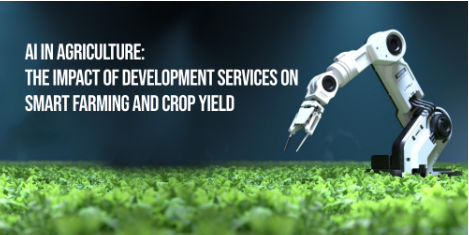The ever-rising emergence of artificial intelligence has brought a significant shift in several industries. The agricultural sector is one such sector where AI development services have extensively revolutionized the ways farming is done.
The contemporary agricultural landscape is advancing by integrating innovative approaches and AI-powered technologies. It is often reported that the value of AI in the global agricultural market is projected to be $1.7 billion in 2023, and can further grow to $4.7 billion by 2028. Besides, with smart farming techniques, the future of the agricultural sector looks brighter than ever.
Understanding Artificial Intelligence in the Agricultural Domain
The role of artificial intelligence in the agricultural sphere involves the usage of AI and its subsets to automate the operations that are conventionally performed by humans. For this purpose, machine learning algorithms are used to train systems, identify patterns, and make informed decisions with the least possible human intervention.
Apart from this, the technology provides farmers with advanced tools to get actionable insights in a convenient manner. After a profound analysis of these valuable insights, they can easily take apt actions to optimize their crop yield.
The Impact of AI Development Services in Agriculture and Farming
Until recently, the advent of artificial intelligence solutions was mostly seen in the secondary and tertiary sectors. However, by witnessing the potential benefits of AI in banking, manufacturing, retail, e-commerce, healthcare, and education, businesses in the primary sector have also begun incorporating AI solutions.
- By automating the conventional, time-consuming tasks in the agricultural sector, the consistent issue of hiring more and more people has been resolved.
- AI-powered devices run based on the data provided by the users. These tools use high computational techniques and algorithms to provide more accurate and efficient results.
- With predictive analytics, farmers can identify patterns and determine the root cause of errors, if any, that hinder productivity. Besides that, the technology could also be used to manage risks and prepare results-oriented strategies.
- AI and ML algorithms can evaluate the chemical composition of soil. Farmers can use this analysis to determine which nutrients are lacking or are in excess to increase soil fertility.
- When it comes to harvesting, AI can prove to be helpful in determining the best time to harvest crops and improving crop yields.
Prominent Applications of AI in Agriculture and Smart Farming
By implementing intelligent farming methods powered by AI, the agricultural sector can easily facilitate several complex operations. Here are some of the notable applications of AI in agriculture and smart farming.
Precision Farming
Precision agriculture facilitated by smart farming methods utilizes the potential of AI and ML to ensure the optimal use of available resources. From soil conditions to plant physiology, every aspect of the agriculture process could be easily analyzed with artificial intelligence, advising on the most efficient plantation and harvesting strategies.
Leaks and Damage Detection
AI can be used to detect leaks and damage in the irrigation systems. ML algorithms analyze the data associated with the water supply, determining whether there are any anomalies in the pressure or flow of water. This data can help in the early detection of water leakage, preventing water wastage along with potential crop damage.
Automated Irrigation Systems
Although AI itself is a transformative technology, when combined with IoT, it can do wonders. The IoT sensors installed in farmland can monitor the moisture levels and condition of the soil. Besides, these devices can also analyze the weather conditions, providing farmers with real-time insights about how much water the crops would need.
Livestock Health Monitoring
AI-enabled drones incorporated with cameras and computer vision technology help in monitoring the health of livestock remotely. With this integrated technology, cattle owners can identify the atypical behavior of the livestock. A company known as CattleEye uses this solution to provide valuable insights to farmers who need to improve the well-being of cattle.
Smart Pesticide Application
The right usage of pesticides is crucial for crop optimization. However, farmers face numerous challenges in both manual and automated modes of pesticide application. Applying pesticides manually is time-consuming and difficult, and automated pesticide spraying might lack accuracy.
Final Thoughts
With the potential improvement in artificial intelligence, it’s clear that AI will play a significant role in the agriculture and farming industry. Over the years, technology has been at the forefront of agriculture, be it tools, irrigation systems, tractors, or soil monitoring sensors. Each development has helped improve efficiency, reducing the challenges faced by the farmers.
Furthermore, smart farming, pre-built automation tools, and AI-powered solutions drive strategic operations that earlier needed human intervention. However, one can’t deny the fact that farmers need to be trained and educated to take the complete leverage of AI automation tools. If done rightly, there is no doubt that the future of agriculture is bound to be fruitful.

